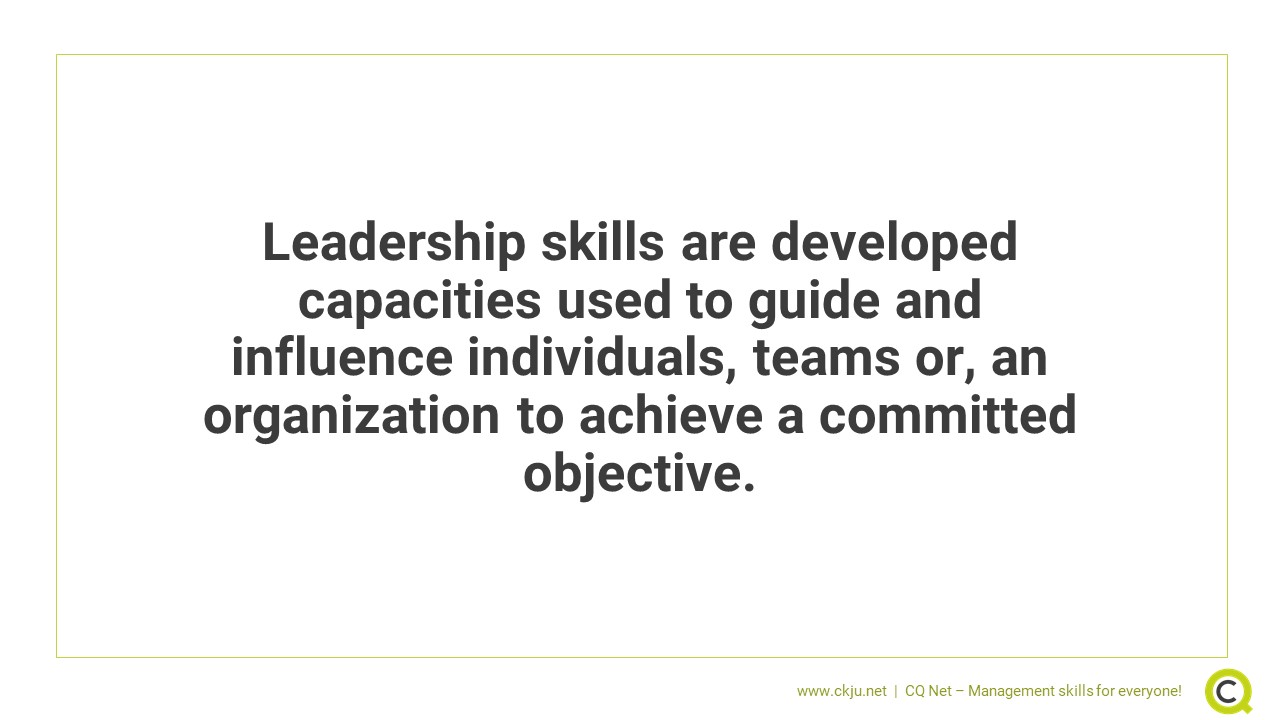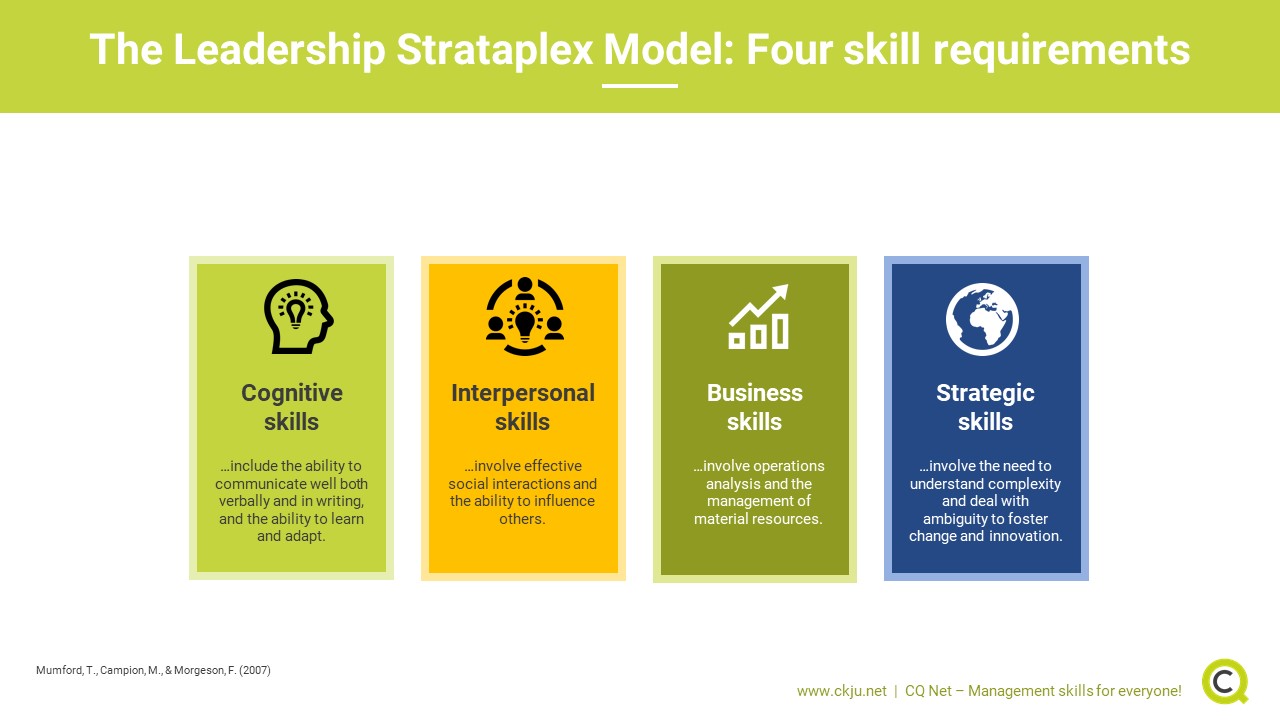- All Management Learning Resources
- Leadership skills

Why should you care about leadership skills?
There is a vast amount of research about which leadership skills drive leadership performance. In this CQ Dossier we introduce the concept of leadership skills, different leadership skill models, and the benefits associated with a skill-based approach. In addition, we also provide some practical insight into how to develop and foster leadership skills as part as professional development efforts.
Contents
- Why should you care about leadership skills?
- Why should you care about leadership skills?
- What are leadership skills?
- The three skill-approach to leadership
- Skill-based approach to leadership
- Leadership skills strataplex model
- Leadership skills and effective leadership behavior
- Leadership skills and leadership competencies
- Benefits of leadership skill models
- Critical appraisal of leadership skills: Solidity rating 3
- Key recommendations for professionals
- References and further reading
Why should you care about leadership skills?
There are hundreds of definitions of leadership. At its core, leadership is a soft skill to influence individuals, teams or an organization to achieve a committed objective. As a professional you exert leadership – more or less consciously – on a daily basis.
Whether you are in charge of a project, want to introduce a new product or improve a process, leadership skills are the foundation to successfully completing your endeavor. This makes leadership skills a top priority target of your professional development efforts. However, we must pause and ask: what are leadership skills and how can you actively develop them?
What are leadership skills?
The question whether leaders are born or made is still an ongoing discussion in leadership science. While there is no definite answer to this question, it gets more and more clear that both your leadership abilities and leadership skills have an impact on whether you are an effective leader or not.
Of course, you can work both on your leadership abilities and skills. However, there is some evidence (Johnson et al., 1998) that leadership abilities are determined to a considerable amount by genetics and early socialization (Mumford et al., 2017). There is still potential to work on your leadership abilities, but it is much easier to develop and improve your leaderships skills (Maurer and Lippstreu, 2008).
On a general level, skills are developed capacities used to perform in specific domains and situations. Skills are an important prerequisite to performing well in almost any type of job. However, the skills required for specific occupations vary depending on domain and situation. In addition, they are not static but change over time (Reiter-Palmon et al., 2006).
Leadership skills are developed capacities used to guide and influence individuals, teams or, an organization to achieve a committed objective. Unfortunately, there are no one-size fits all leadership skills. Although, there are is a set of skill-based approaches to leadership you can use for professional development. We will have a look at the most important ones in the following section.
The three skill-approach to leadership
One of the first skill-based leadership models distinguishes between three basic skills a leader (called 'administrator' by Katz (1974)) has to be capable of. Katz (1974) stated that technical skills, human skills and conceptual skills are important for executives in order to be an effective leader. Although the three-skill approach has been around for many years, it still provides an up-to-date, basic understanding of what leadership skills are.
Skill-based approach to leadership
Organizational life consists to a great extent of recognizing issues, developing solutions, and implementing them in a sustainable way. All of this happens in a complex network of social relationships, limited resources, and time restrictions. A volatile, uncertain, complex, and ambiguous (VUCA) environment represented by competitors, markets, regulators etc. adds another layer of complexity to your leadership tasks.
The skill-based approach to leadership (Mumford, Zaccaro et al., 2000) takes this into consideration and argues that leadership skills can be boiled down to the following three categories:
- Complex problem-solving skills,
- social judgment skills, and
- knowledge accumulated over time.
Complex problem-solving skills
Complex problem-solving starts with recognizing the signal from the noise. You need to recognize the most pressing problems with the highest likelihood to be solved within an appropriate timeframe. Complex problem-solving involves skills such as information gathering, diverse thinking, problem framing and communication. Interestingly, there is evidence that problem-solving skills are not fully determined by cognitive ability but are a category by their own (Mumford, Zaccaro et al., 2000). Thus, honing your problem-solving skills will increase your leadership performance.
Social judgment skills
Organizations are by nature social entities. In order to solve complex problems, you need to anticipate needs and expectations, leverage networks, create coalitions, convince people and solve conflicts. In many cases, a linear intervention targeting at the people involved in the issues won`t be sufficient. Instead, you will rely on your social judgement skills such as your political skills, your social perceptiveness, and behavioral flexibility (Mumford, Zaccaro et al., 2000).
Knowledge accumulated over time
The third and final leadership skill category is about your knowledge how to solve complex problems in different situations. However, knowledge as a leadership skill category is not just about applying best practices that have proven beneficial earlier in the same way again in a different context. Instead, it is about adjusting management tools, models and best practices that worked earlier in a way such that they work again in a different context with different people involved.
Leadership skills strataplex model
The leadership skills strataplex model (Mumford et al., 2007) takes a slightly different approach to leadership skills. In a research study, Mumford et al. (2007) looked at how leadership skill requirement change with leaders moving up the career ladder from junior to senior managers.
In addition to the leadership skills addressed earlier, the model adds cognitive skills and strategic skills to its four core leadership skill categories:
- cognitive skills,
- interpersonal skills,
- business skills, and
- strategic skills.
The study found support for the claim that the level of leadership skills required increases with organizational level. This applies especially to business and strategic skills according to Mumford et al. (2007).
In addition, the leadership skills strataplex model also relies on interpersonal and business skills which are at least partly covered by the skill-based approach to leadership.
Leadership skills and effective leadership behavior
As previously stated, leadership behaviors are the observable actions intended to influence individuals, teams or an organization to achieve a committed objective. In that, leadership behaviors are the result of effective leadership skills and thus provide important insights into which leadership skills you should strive for.
In an attempt to shed light on which leadership behaviors are most effective, Yukl (2012) found the following four main categories:
- Task-oriented leadership behaviors
- Relations-oriented leadership behaviors
- Change-oriented leadership behaviors
- External leadership behaviors
Leadership skills and leadership competencies
Leadership competencies are another approach to leadership development you should be aware of. In contrast to leadership skills, leadership competencies are more broadly defined and represent a combined set of knowledge, skills and abilities (KSA) that constitute effective leadership.
Taking this into consideration, one could argue that leadership skills are a subset of leadership competencies. However, in many cases it is not possible to draw a clear line between the two concepts. For instance, the leadership skills straplex model covers traits and knowledge in addition to skills.
Benefits of leadership skill models
There is a huge amount of knowledge available about what constituted effective leadership. A skill-based approach to leadership adds another valuable perspective about what makes an effective leader. The key benefits are as follows:
- Leadership skills provide practical guidance what is effective leadership
- Leadership skills can be learned, trained, and developed
- Leadership skills give guidance but don`t determine effective leadership
Critical appraisal of leadership skills: Solidity rating 3
Leadership skills are an important management tool that provides guidance for professionals how to become an effective leader. There is some evidence available that supports the relationship between leadership skills and leadership performance. However, to fully confirm this relationship, additional empirical research is necessary. Therefore, this CQ Dossier is assigned a Level 3 rating (Based on a 1- 5 measurement scale). A level 3 rating refers to "Measured –Multidisciplinary" with a moderate predictive ability, reliability, and validity.
Key recommendations for professionals
- Leadership skills are developed capacities used to guide and influence individuals, teams, or an organization to achieve a committed objective
- It is easier to develop and improve leadership skills than leadership abilities as they are partly determined by genetics and socialization
- The skill-based approach to leadership distinguishes three leadership skill categories: complex problem solving, social judgement skills and knowledge
- Research indicates the level of leadership skills required increases with organizational level
- Effective leadership behaviors draw attention to change-oriented leadership skills as additional skill category
References and further reading
Johnson, A. M., Vernon, P. A., McCarthy, J. M., Molson, M., Harris, J. A. and Jang, K. L. (1998) ‘Nature vs nurture: Are leaders born or made? A behavior genetic investigation of leadership style’, Twin Research, vol. 1, no. 4, pp. 216–223.
Katz, R. L. (1974) ‘Skills of an effective administrator’, Harvard Business Review [Online]. Available at https://hbr.org/1974/09/skills-of-an-effective-administrator.
Lacerenza, C. N., Reyes, D. L., Marlow, S. L., Joseph, D. L. and Salas, E. (2017) ‘Leadership training design, delivery, and implementation: A meta-analysis’, The Journal of applied psychology, vol. 102, no. 12, pp. 1686–1718.
Maurer, T. J. and Lippstreu, M. (2008) ‘Expert vs. general working sample differences in KSAO improvability ratings and relationships with measures relevant to occupational and organizational psychology’, Journal of Occupational and Organizational Psychology, vol. 81, no. 4, pp. 813–829.
Mumford, M. D., Marks, M. A., Connelly, M. S., Zaccaro, S. J. and Reiter-Palmon, R. (2000) ‘Development of leadership skills’, The Leadership Quarterly, vol. 11, no. 1, pp. 87–114.
Mumford, M. D., Todd, E. M., Higgs, C. and McIntosh, T. (2017) ‘Cognitive skills and leadership performance: The nine critical skills’, The Leadership Quarterly, vol. 28, no. 1, pp. 24–39.
Mumford, M. D., Zaccaro, S. J., Harding, F. D., Jacobs, T.O. and Fleishman, E. A. (2000) ‘Leadership skills for a changing world’, The Leadership Quarterly, vol. 11, no. 1, pp. 11–35.
Mumford, T. V., Campion, M. A. and Morgeson, F. P. (2007) ‘The leadership skills strataplex: Leadership skill requirements across organizational levels’, The Leadership Quarterly, vol. 18, no. 2, pp. 154–166.
Reiter-Palmon, R., Young, M., Strange, J., Manning, R. and James, J. (2006) ‘Occupationally-specific skills: Using skills to define and understand jobs and their requirements’, Human Resource Management Review, vol. 16, no. 3, pp. 356–375.
Yukl, G. (2012) ‘Effective Leadership Behavior: What We Know and What Questions Need More Attention’, Academy of Management Perspectives, vol. 26, no. 4, pp. 66–85.
About the Author





